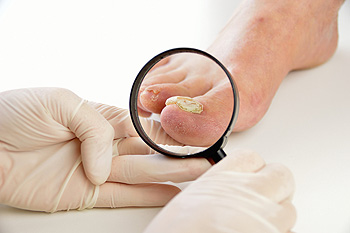Connect With Us
Items filtered by date: February 2021
Understanding How Fungal Nail Infections Occur
Fungal toena il infections, also known as onychomycosis, are common infections that lead to the nails becoming discolored, yellowed, thickened, and brittle, often causing them to break. They are usually caused by fungi or yeast that enter into small cracks in the nail, ultimately infecting them. While toenail infections can affect people of any age, they are more likely in patients who have a nail injury, a weakened immune system, are older, or have athlete’s foot. The easiest way to prevent these infections is to keep the toes clean and dry. Fungi thrives in warm and moist environments, so it is important to not walk barefoot in public locker rooms and showers. Because fungal nail infections are difficult to cure, it is important to visit with a podiatrist if you notice signs of toenail fungus.
il infections, also known as onychomycosis, are common infections that lead to the nails becoming discolored, yellowed, thickened, and brittle, often causing them to break. They are usually caused by fungi or yeast that enter into small cracks in the nail, ultimately infecting them. While toenail infections can affect people of any age, they are more likely in patients who have a nail injury, a weakened immune system, are older, or have athlete’s foot. The easiest way to prevent these infections is to keep the toes clean and dry. Fungi thrives in warm and moist environments, so it is important to not walk barefoot in public locker rooms and showers. Because fungal nail infections are difficult to cure, it is important to visit with a podiatrist if you notice signs of toenail fungus.
For more information about treatment, contact Ali Davis, DPM of The Foot Clinic. Our doctor can provide the care you need to keep you pain-free and on your feet.
Toenail Fungus Treatment
Toenail fungus is a condition that affects many people and can be especially hard to get rid of. Fortunately, there are several methods to go about treating and avoiding it.
Antifungals & Deterrence
Oral antifungal medicine has been shown to be effective in many cases. It is important to consult with a podiatrist to determine the proper regiment for you, or potentially explore other options.
Applying foot powder on the feet and shoes helps keep the feet free of moisture and sweat.
Sandals or open toed shoes – Wearing these will allow air movement and help keep feet dry. They also expose your feet to light, which fungus cannot tolerate. Socks with moisture wicking material also help as well.
If you have any questions please feel free to contact our office located in Overland Park, KS . We offer the newest diagnostic tools and technology to treat your foot and ankle needs.
Psoriatic Arthritis Can Affect the Feet
 Each foot consists of several bones, ligaments, and tendons. The skin on the feet differs from the rest of the body by being thicker and having numerous sweat glands. This is helpful in monitoring the impact that occurs from walking and standing for the majority of the day. Psoriasis is a medical condition that can cause the feet to become arthritic. It can cause severe pain and discomfort, and may be recognized by noticing yellow and white areas on the feet that are filled with pus. The symptoms of psoriatic arthritis can include pain in the ankle joints, and it may be difficult to point and flex the foot. If you have symptoms of arthritis in the feet, it is strongly suggested that you are under the care of a podiatrist who can effectively help you to manage this condition.
Each foot consists of several bones, ligaments, and tendons. The skin on the feet differs from the rest of the body by being thicker and having numerous sweat glands. This is helpful in monitoring the impact that occurs from walking and standing for the majority of the day. Psoriasis is a medical condition that can cause the feet to become arthritic. It can cause severe pain and discomfort, and may be recognized by noticing yellow and white areas on the feet that are filled with pus. The symptoms of psoriatic arthritis can include pain in the ankle joints, and it may be difficult to point and flex the foot. If you have symptoms of arthritis in the feet, it is strongly suggested that you are under the care of a podiatrist who can effectively help you to manage this condition.
Arthritis can be a difficult condition to live with. If you are seeking treatment, contact Ali Davis, DPM from The Foot Clinic. Our doctor can provide the care you need to keep you pain-free and on your feet.
Arthritic Foot Care
Arthritis is a joint disorder that involves the inflammation of different joints in your body, such as those in your feet. Arthritis is often caused by a degenerative joint disease and causes mild to severe pain in all affected areas. In addition to this, swelling and stiffness in the affected joints can also be a common symptom of arthritis.
In many cases, wearing ill-fitting shoes can worsen the effects and pain of arthritis. Wearing shoes that have a lower heel and extra room can help your feet feel more comfortable. In cases of rheumatoid arthritis, the arch in your foot may become problematic. Buying shoes with proper arch support that contour to your feet can help immensely.
Alleviating Arthritic Pain
- Exercises that stretch the foot can prevent further pain and injury and increase mobility
- Most of the pain can be alleviated with anti-inflammatory drugs, heat, and topical medications
- Massages can help temporarily alleviate pain.
It is best to see your doctor for the treatment that is right for your needs and symptoms. Conditions vary, and a podiatrist can help you determine the right method of care for your feet.
If you have any questions, please feel free to contact our office located in Overland Park, KS . We offer the newest diagnostic tools and technology to treat your foot and ankle needs.
Necessary Care for a Broken Foot
 A broken foot can happen as a result of falling or enduring a sudden injury. The healing process can begin when a proper diagnosis is performed, which generally means having an X-ray taken. This is commonly followed by wearing a protective boot or cast, and it may help existing swelling when the foot is frequently elevated. The boot or cast may aid in walking while attempting to complete daily activities. If the fracture is severe, and the bone is protruding from the skin, surgery may be necessary for proper healing. It is suggested that you consult with a podiatrist if you have broken your foot.
A broken foot can happen as a result of falling or enduring a sudden injury. The healing process can begin when a proper diagnosis is performed, which generally means having an X-ray taken. This is commonly followed by wearing a protective boot or cast, and it may help existing swelling when the foot is frequently elevated. The boot or cast may aid in walking while attempting to complete daily activities. If the fracture is severe, and the bone is protruding from the skin, surgery may be necessary for proper healing. It is suggested that you consult with a podiatrist if you have broken your foot.
A broken foot requires immediate medical attention and treatment. If you need your feet checked, contact Ali Davis, DPM from The Foot Clinic. Our doctor can provide the care you need to keep you pain-free and on your feet.
Broken Foot Causes, Symptoms, and Treatment
A broken foot is caused by one of the bones in the foot typically breaking when bended, crushed, or stretched beyond its natural capabilities. Usually the location of the fracture indicates how the break occurred, whether it was through an object, fall, or any other type of injury.
Common Symptoms of Broken Feet:
- Bruising
- Pain
- Redness
- Swelling
- Blue in color
- Numbness
- Cold
- Misshapen
- Cuts
- Deformities
Those that suspect they have a broken foot shoot seek urgent medical attention where a medical professional could diagnose the severity.
Treatment for broken bones varies depending on the cause, severity and location. Some will require the use of splints, casts or crutches while others could even involve surgery to repair the broken bones. Personal care includes the use of ice and keeping the foot stabilized and elevated.
If you have any questions please feel free to contact our office located in Overland Park, KS . We offer the newest diagnostic and treatment technologies for all your foot and ankle needs.
Can Neuropathy Be Inherited?
 Peripheral neuropathy is the result of nerve damage that occurs in the extremities such as the hands and feet. When this peripheral neuropathy is inherited, it is known as Charcot-Marie-Tooth, or CMT. Charcot-Marie-Tooth affects people worldwide. While CMT is not life threatening, it does lead to the loss of mobility and function in the extremities as the nerves degenerate. There are many different genetic causes for CMT, but most cases have a variety of similar symptoms. These symptoms include having high arched feet, structural foot deformities and weakening of the muscles. Patients who are suffering from CMT should consult with a podiatrist for treatment options that can help improve function. Treatment options may include physical therapy, bracing, wearing properly fitting footwear, and maintaining a healthy weight.
Peripheral neuropathy is the result of nerve damage that occurs in the extremities such as the hands and feet. When this peripheral neuropathy is inherited, it is known as Charcot-Marie-Tooth, or CMT. Charcot-Marie-Tooth affects people worldwide. While CMT is not life threatening, it does lead to the loss of mobility and function in the extremities as the nerves degenerate. There are many different genetic causes for CMT, but most cases have a variety of similar symptoms. These symptoms include having high arched feet, structural foot deformities and weakening of the muscles. Patients who are suffering from CMT should consult with a podiatrist for treatment options that can help improve function. Treatment options may include physical therapy, bracing, wearing properly fitting footwear, and maintaining a healthy weight.
Neuropathy
Neuropathy can be a potentially serious condition, especially if it is left undiagnosed. If you have any concerns that you may be experiencing nerve loss in your feet, consult with Ali Davis, DPM from The Foot Clinic. Our doctor will assess your condition and provide you with quality foot and ankle treatment for neuropathy.
What Is Neuropathy?
Neuropathy is a condition that leads to damage to the nerves in the body. Peripheral neuropathy, or neuropathy that affects your peripheral nervous system, usually occurs in the feet. Neuropathy can be triggered by a number of different causes. Such causes include diabetes, infections, cancers, disorders, and toxic substances.
Symptoms of Neuropathy Include:
- Numbness
- Sensation loss
- Prickling and tingling sensations
- Throbbing, freezing, burning pains
- Muscle weakness
Those with diabetes are at serious risk due to being unable to feel an ulcer on their feet. Diabetics usually also suffer from poor blood circulation. This can lead to the wound not healing, infections occurring, and the limb may have to be amputated.
Treatment
To treat neuropathy in the foot, podiatrists will first diagnose the cause of the neuropathy. Figuring out the underlying cause of the neuropathy will allow the podiatrist to prescribe the best treatment, whether it be caused by diabetes, toxic substance exposure, infection, etc. If the nerve has not died, then it’s possible that sensation may be able to return to the foot.
Pain medication may be issued for pain. Electrical nerve stimulation can be used to stimulate nerves. If the neuropathy is caused from pressure on the nerves, then surgery may be necessary.
If you have any questions, please feel free to contact our office located in Overland Park, KS . We offer the newest diagnostic and treatment technologies for all your foot care needs.
Blog Archives
- April 2024
- March 2024
- February 2024
- January 2024
- December 2023
- November 2023
- October 2023
- September 2023
- August 2023
- July 2023
- June 2023
- May 2023
- April 2023
- March 2023
- February 2023
- January 2023
- December 2022
- November 2022
- October 2022
- September 2022
- August 2022
- July 2022
- June 2022
- May 2022
- April 2022
- March 2022
- February 2022
- January 2022
- December 2021
- November 2021
- October 2021
- September 2021
- August 2021
- July 2021
- June 2021
- May 2021
- April 2021
- March 2021
- February 2021
- January 2021
- December 2020
- November 2020
- October 2020
- September 2020
- August 2020
- July 2020
- June 2020
- May 2020
- April 2020
- March 2020
- February 2020
- January 2020
- December 2019
- November 2019
- October 2019
- September 2019
